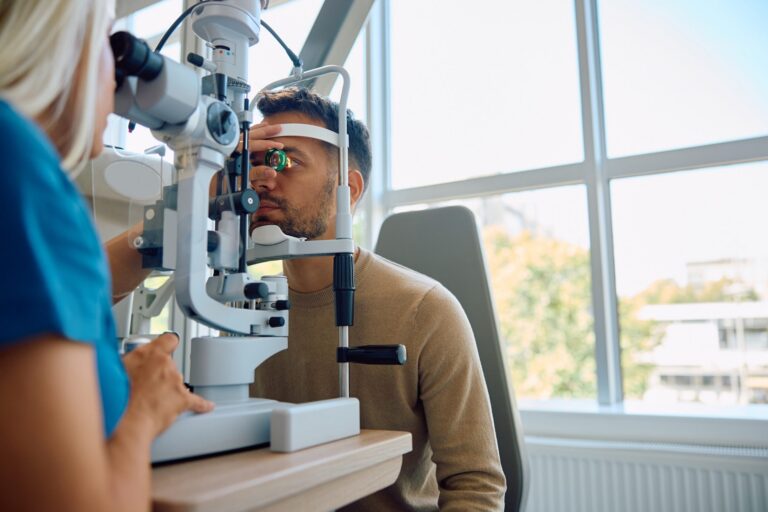
What Are Tears and Detachments?
If you have a torn or detached retina, this usually happens when the vitreous liquid in your eye starts to congeal and decrease in size and is an age-related disease. When the vitreous fluid starts to thicken and shrink, it can tug or pull on the retina, which causes the tear and then ultimately, it can become detached. For many men and women, this process only creates flashes and floaters, which usually aren’t serious. However, an abrupt or aggressive pull could create a tear or detachment. Retinal detachments and tears can become very serious and may cause blindness if not diagnosed within a certain amount of time.
If you start to notice floaters, flashes, or problems with your peripheral vision, we strongly encourage you to schedule a comprehensive eye exam as soon as you can.
Our board-certified ophthalmologists at Ophthalmology Associates of the Valley in San Fernando Valley of Los Angeles, CA have a wide variety of advanced techniques and treatments to help diagnose and manage retinal tears and detachments. Please schedule an appointment at either of our locations in Encino or West Hills to learn more.
What Are the signs of a tear or detachment?
If you notice increased flashes, floaters, hazy vision, or issues with your peripheral sight, these could all potentially indicate a detached or torn retina.
Other symptoms that are associated with a retinal problem may include:
Sudden decrease in vision acuity
Sudden increase in the presence of floaters and/or flashes
Sudden or a gradual increase of darkened vision, such as when clouds float past the sun
Sudden loss of color (light colors look dull or gray)
Decreased peripheral vision
Most patients do not experience the normal signs of retinal detachment or tear until after the condition has become more advanced.
What Are the Risk Factors for Retinal Tears and Detachments?
Retinal tears and detachments are more likely to occur in older adults, especially those over 50, and in individuals with high myopia, where the elongated eyeball makes the retina thinner and more susceptible to damage. Previous eye surgeries, significant trauma, and conditions like posterior vitreous detachment (PVD) or diabetic retinopathy further elevate the risk.
A family history of retinal issues, pre-existing retinal conditions such as lattice degeneration, and chronic inflammatory disorders like uveitis also contribute to the likelihood of these serious eye conditions. Regular eye exams are vital for those at higher risk to ensure early detection and treatment.
What causes Tears and Detachments?
As we age, the process can impact many parts of our appearance or health, and our eyes are just as prone to experiencing problems with aging. As men and women start to grow older, the vitreous fluid within their eyes starts to thicken, making it congeal together and decrease in size. When this area starts to get smaller, it causes the fluid to move away from or pull at the retina, which creates a tear.
After developing a tear, the remaining fluid could start to leak and raise the retina, causing a retinal detachment. If you have certain health or eye conditions, including diabetes, autoimmune disease, or myopia, you have a higher chance of experiencing a retinal tear or detachment.
Additional causes include:
Diabetic Retinopathy
Fluid accumulation related to macular degeneration
Scar tissue on the retina
How Are Retinal Tears and Detachments Diagnosed?
First, our staff will apply some eye drops to your affected eye. This will dilate your pupil so we can get a better look at your retina. We’ll likely use some lights and/or lenses to get an in-depth look at the area and identify the problem. If a retinal tear or detachment is spotted, we will recommend scheduling immediate treatment.
How Can Tears and Detachments Be Treated?
To prevent long-term damage, we highly recommend scheduling an appointment as soon as possible. Early detection can prevent the retina from becoming detached. Additionally, procedures for retinal tears are not as invasive and can provide significant improvements to your eye health. If you have a retinal tear, we offer laser treatments or panretinal photocoagulation, which help seal the tear. This prevents liquid from seeping into the eye while potentially stopping future detachment.
Generally, retinal tears have less intrusive procedure options; however, a retinal detachment usually needs surgery to treat the issue. Certain procedural techniques that require us to place the retina in its normal place are more aggressive and require a longer time to heal. Usually, many patients tend to experience better eyesight and ocular health after retinal surgery. However, this is based on the severity of your condition and if you have any previous damage to the retinal nerves. At Ophthalmology Associates of the Valley in San Fernando Valley of Los Angeles, CA, we offer a range of retinal surgeries that are tailored to meet your needs and your unique condition.
Retinal tears and detachment FAQ
Call Today for Help
If you notice symptoms associated with a retinal tear or detachment, we highly recommend scheduling an eye exam with one of our board-certified ophthalmologists soon.
At Ophthalmology Associates of the Valley in San Fernando Valley of Los Angeles, CA, our group proudly offers state-of-the-art laser technology and a variety of innovative services to improve ocular health and vision acuity.
Please contact one of our offices in Encino or West Hills to reduce any additional damage.






